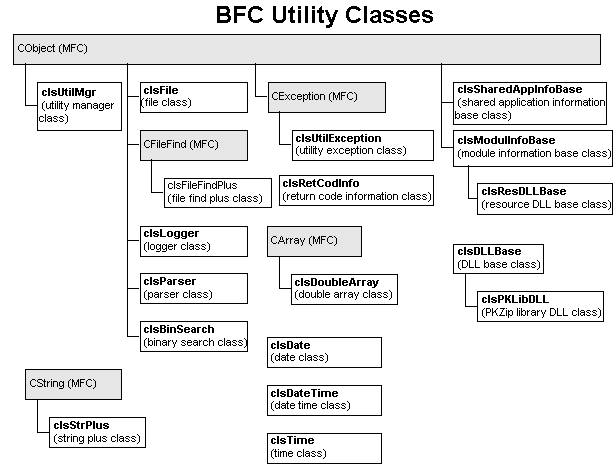 |
.NET database and distributed computing tools |
BFC | Visual Studio | Database Technology | Distributed Computing | Screen Classes
BFC's Utility Library Classes
Extending MFC (Microsoft Foundation
Classes)
 BFC is a large, integrated
collection of class libraries, broken down into subsystems that
can be understood separately. A standard BFC application uses four basic low
level libraries as underpinnings: the Utility, Database,
Screen, and Application
libraries (derived in that order). The lowest level subsystem is the Utility
Library (B1ULib), which has a set of useful utility classes, which aid
programmers in handling dates, times, strings, 16 to 32 bit conversion,
internationalization, parsing, file compression, error handling, etc. BFC is a large, integrated
collection of class libraries, broken down into subsystems that
can be understood separately. A standard BFC application uses four basic low
level libraries as underpinnings: the Utility, Database,
Screen, and Application
libraries (derived in that order). The lowest level subsystem is the Utility
Library (B1ULib), which has a set of useful utility classes, which aid
programmers in handling dates, times, strings, 16 to 32 bit conversion,
internationalization, parsing, file compression, error handling, etc. |
|
The BFC String Plus Class, clsStrPlus, is an example of a class built by extending an MFC class, in this case, CString. On the other hand, the error classes and the DLL management classes are examples of utility classes built from scratch, starting either with MFC CObject or no base class at all. The Utility library provides services to all the other subsystems but knows nothing of their existence. In other words, no header files from any other BFC library are included in the Utility library. The Utility library underlies all other BFC subsystems. Besides being heavily used by the rest of BFC, the Utility library makes available a large set of foundation classes for use by application programmers. The Utility library includes classes such as:
BFC Utility Classes Hierarchy Chart |

|
BFC | Visual Studio | Database Technology | Distributed Computing | Screen Classes
|
|
|||||||
| Home | Products | Consulting | Case Studies | Order | Contents | Contact | About Us |
|
|
|||||||
|
Copyright © 2012, Base One International Corporation |
|||||||